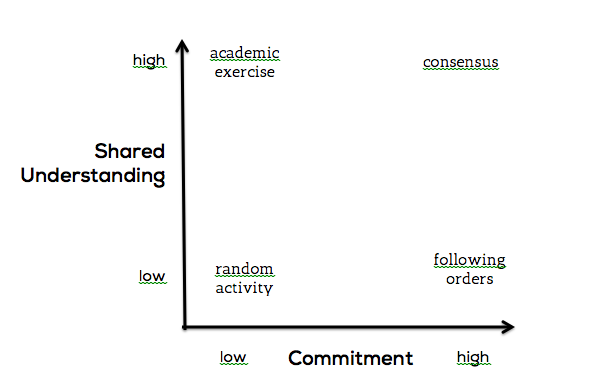Today I am delivering a pilot version of a workshop on strategic risk and decision making for management teams, co-delivered with Elizabeth Engel and Leslie White. Leslie is leading the discussion on risk and Elizabeth is digging into how strategic thinking (as opposed to strategic planning) connects to risk, both in terms of protecting against threats and seizing opportunities. My piece focuses on the capacity for successfully having those conversations at the management team level, particularly when there will NOT be any objective proof about the right course of action.
And this brought me to the word, “consensus.” Many years ago I posted my favorite definition of consensus, which comes from Michael Roberto and his book, Why Great Leaders Don’t Take Yes for an Answer. It boils down to a combination of a high level of shared understanding, combined with a high level of commitment. Note that “agreement” is not part of the definition.
There are times where the people in the room are simply not going to agree. Maybe I really value the upside of this opportunity much more than you do, which is why we come down on different sides of the risk conversation (I think we should take the risk, and you don’t). We might not ever agree on the value of this opportunity, but if we take the time to understand each other (why I value it, and why you don’t), we’ll have all the issues out on the table. At some point, we’ll have to make a decision, and one of us will be disappointed, but at least we’ll understand all the issues the same way. When that happens, I can commit to the decision that is made, even if it’s not the one I want. I know the group heard and understood me and had to make a tough call, that happened to not go my way.
What happens if you don’t have the discipline to tackle consensus in this way?

Low understanding but high commitment: following orders. The danger here is that the decisions get consciously or sub-consciously sabotaged later because people are bitter about their side not being understood.
High understanding but low commitment: academic exercise. We spent hours getting clear on it, but we have no idea if anyone is committed to the decision or will follow up on it. This is very inefficient. Sound like any board meetings you know?
Low understanding and low commitment: random activity. Good luck with that.
If you’re interested in having this half-day workshop run for your management team, let me know.
